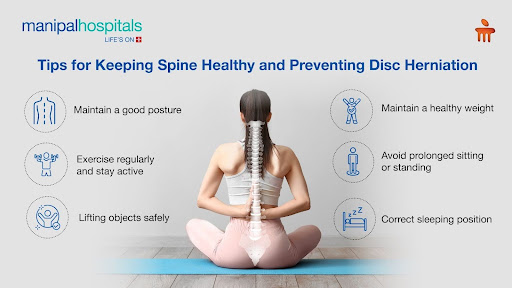A sedentary lifestyle and desk jobs contribute significantly to back pain issues, with one notable result being a herniated disc. Annually, between 5 to 20 out of every 1000 adults experience herniated discs. It is most common in older people, with age, genetics, and physical trauma or injury being its main causes. A healthy spine is crucial as it provides support and flexibility for everyday movements. Disc herniation can cause significant discomfort and impact daily life. Let’s explore some valuable tips to maintain a healthy spine and reduce the risk of disc herniation.
Synopsis
What is a Herniated Disc?
A herniated disc, also known as a slipped, bulging, or ruptured disc, occurs when the soft inner core of a spinal disc pushes through a tear into the tougher outer layer. Herniated discs can develop in any region of the spine but are most frequently found in the lower back (lumbar spine) and neck (cervical spine). This condition leads to pain, numbness, or weakness in the arm or leg, depending on which part of the spine is affected. Factors like age-related wear and tear, repetitive lifting, or sudden strenuous activities can contribute to herniated discs.
Tips for Keeping Spine Healthy and Preventing Disc Herniation

Herniated discs are often the result of ageing, but your risk of getting a spinal disk problem can be reduced by adopting preventive measures and making a few lifestyle changes. Here are some tips for disc herniation prevention and strengthening your spine:
1. Maintain a Good Posture
A poor posture while standing, sitting, or lifting objects can lead to various medical issues, especially lumbar spine disc disease. To maintain a good posture, use these tips:
-
Keep your shoulders, back, and neck aligned over your hips while standing.
-
Always sit with your feet touching the floor and knees bent at a 90-degree angle.
-
Avoid slouching when using the computer or laptop.
-
If you have a desk job, use ergonomic furniture (a chair with lumbar support) to support your back.
-
Adjust computer monitors to be at your eye level.
2. Exercise Regularly and Stay Active
Regular exercise benefits your overall health, especially exercises that target and strengthen the core muscles, supporting your spine. Engage in low-impact exercises such as yoga, pilates, or swimming. Add aerobic and flexibility exercises into your exercise regimen, which improves the cardiovascular system, reduces weight, and keeps the back muscles and ligaments stretched. These exercises can reduce your likelihood of having a back disc problem. Incorporate physical activity for at least 30 minutes into your daily routine to keep your spine flexible and strong.
3. Lifting Objects Safely
When lifting any heavy objects, you can unnecessarily stress your back, improving the chances of getting a herniated disc. Follow these safe lifting techniques to minimize strain on the spine:
-
Instead of bending directly, keep the back straight and bend at your knees.
-
Squat at your knees to pick things up.
-
Ask for help when it is too heavy.
-
Hold items near your body (like you are hugging them).
4. Maintain a Healthy Weight
Having excess weight puts additional stress on your spine. So, try to maintain a healthy diet and exercise schedule to maintain a healthy weight, thus reducing your risk of getting a herniated disc.
5. Avoid Prolonged Sitting or Standing
Desk jobs require sitting for long periods, which can exert additional pressure on your spine and contribute to spinal disc problems. Even prolonged standing poses similar challenges. To mitigate these risks, it's advisable to take breaks and stretch after every 30 minutes. Additionally, alternate between sitting and standing positions throughout the day to reduce stiffness and strain on your spine.
6. Correct Sleeping Position
To maintain a healthy spine, your sleeping position is just as crucial as your standing or sitting posture. Avoid sleeping on your stomach to avoid straining your spine, particularly the cervical spine. Follow these healthy sleeping habits to support your joints and spine:
-
Sleep on your back or side.
-
Use a firm mattress to support your back.
-
Place a pillow under your knees or between your legs to support your spine.
Conclusion
Take your spine health seriously, regardless of your age. By implementing these preventive measures and maintaining a healthy lifestyle, you can significantly reduce the risk of developing a herniated disc and enjoy a healthier, pain-free life. Even if a herniated disc occurs despite your best efforts, rest assured that physical therapy, injections, and herniated disc treatment can correct the issue.
For more information on spine care tips and expert herniated disc treatment, schedule a consultation with our orthopaedic doctors in Bhubaneswar. Don’t wait to take care of your spine—contact us today! Check out our blog page to get the latest updates in the medical world.




















10.png)
 5 Min Read
5 Min Read
















